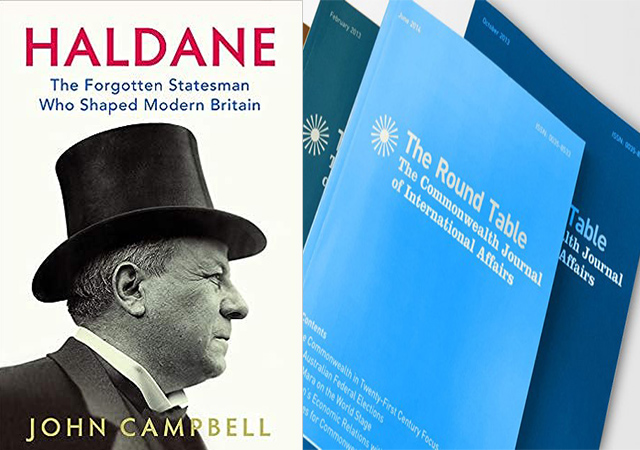
[This is an excerpt from an article in The Round Table: The Commonwealth Journal of International Affairs.]
Richard Haldane was an eminent Scot at a period when Scotland made some of its most important contributions to the personnel of British politics and cultural life and manifested the best of Scotland’s justified reputation for not easily tolerating snobbery and inequality of opportunity. Hence, while he was an intimate of Prime Ministers (Conservative) Arthur James Balfour and (Liberal) H.H. Asquith, he also counted James Ramsay Macdonald, first Labour Party Prime Minister (the illegitimate son of a Scottish crofter) as a close member of his circle. That was as well a host of figures in politics, the military and the law, the university sector (not least of all my own University of St. Andrews) and far beyond. These acquaintances were not limited to ‘society’ of the usual kind but also included, at opposite ends, King Edward VIII and Sidney and Beatrice Webb, co-authors of the Labour Party’s Constitution and many more besides. While this biography could easily be accused of exaggerating his ‘man of the people’ profile, he was certainly open to far more influences than many of his day and class, and he listened to a multitude of voices, a man who had no ‘side’ to him.
He roamed the hills that I can (nearly!) see from the windows of my house and yet was as at home in Gottingen as he was in London or any city of the Empire. He was also a man, like all great men or women, who was complicated but able to concentrate his formidable intellect on any problem on which it had to concentrate. He is, rightly, described as being the key architect of the modern (post-Boer War) British army, of our intelligence services and simultaneously of many of Britain’s most celebrated educational institutions, like the London School of Economics, Imperial College, London, Queen’s University Belfast and the National University of Ireland, as well as the fundamentals of the further education sector.
This is a delightful, rather personal and yet thorough and rigorous story of a man who for once lives up to the title of his biography. Do not be put off by its relative length and often dense passages, it is worth submersing yourself in it over a reasonably lengthy period. I do not advise you to read it at one sitting, though that might be possible, as it is in effect a series of smaller accounts of different periods of Haldane’s life and achievements, not necessarily in chronological order, but thematically exposed. In an unorthodox but effective approach, we are given the personal account of his relations with his mother (touching and deeply felt), with women (with whom he had many strong friendships but no real love affairs) and friends (of whom he had many). The themed chapters of various aspects of his agenda include his military reforms, his constitutional reforms (these alone are worth the read) and, my favourites, his economic and philosophical interests. This seems a wise decision as he conducted a number of major personal and official initiatives simultaneously, each one of which would have been impossible for most of his successors, and certainly for the current incumbents of the green benches. He drew on vast reserves of personal integrity and intellect, a rare combination which often drives people in power to arrogance and overreach but not in his case.
Commonwealth bookshelf
Book Review – Politics, poverty and belief: A political memoir
‘Why was this?’ is an underlying question this book constantly seems to ask. He struck me as a man who was both very aware of his antecedents in religion, especially that of the Scottish church, which you really have to witness to understand, and as part of a radical tradition of the centre. He was not revolutionary, but he believed very strongly in evolution and progress, to some extent like many of this last great Liberal generation. They were perhaps uniquely a group who were aware that Britain at the height of its power had to be both backward looking and aware of what might be to come. What George Dangerfield called the ‘strange death of Liberal England’ was largely played out during Haldane’s most influential period in power. It is to that period that we owe the emergence of a welfare Britain where class is no longer the dominant factor and where the ordinary middle and working classes can have previously unimagined access to economic and educational advancement. He played a crucial role in that transformation.
Andrew Williams is Emeritus Professor at the School of International Relations, University of St Andrews.
‘Haldane: The forgotten statesman who shaped modern Britain’ by John Campbell and Richard McLauchlan, London, Hurst, 2020.



